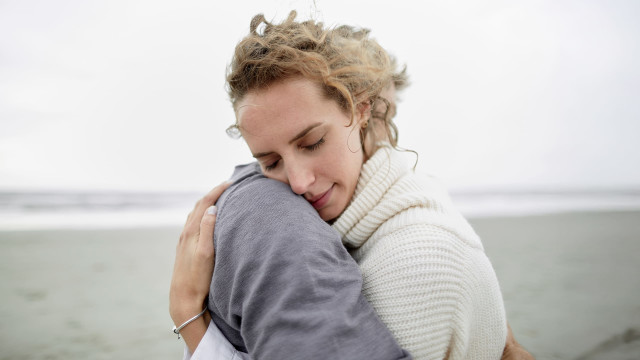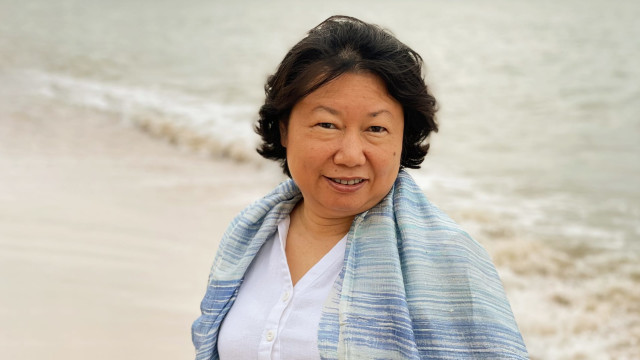Better Decisions From Meditating

After years of trying therapy and self-help books, Sarah Blackburn was still searching for a solution to her feelings of sadness and dissatisfaction. When she discovered meditation, everything changed. Here, she talks about the benefits of finding a teacher, the importance of connecting with others, and why you should train your mind the same way you would a puppy.
Q: How did you first discover meditation?
A: My mom recommended that I try it, and for once, I listened. It was primarily out of desperation, but I decided to give it a shot. I had been seeing a therapist for more than six years and was at the point where I knew what she was going to say before she even said it. It was time to move on, but I knew I needed a weekly check-in with myself to stay sane, so I thought meditation could be that for me. Little did I know that I was going to uncover layers of my heart and mind that I had only scratched the surface of in therapy.
I remember sitting on my bedroom floor, saying to myself, "Just sit still, Sarah! You're just following your breath; it's not that complicated. Why is this so difficult?" But after a week of no success, I realized I should find a class. I tried out a couple of different places before I landed somewhere that vibed with what I wanted. The teachers so clearly described my experience, and they gave me constructive advice on how to handle my meditation obstacles. Most importantly, they inspired me to question myself and my world by looking deeply at my mind.
Q: What are your favorite topics to focus on in your classes?
A: I enjoy teaching beginner meditators. It's such a pleasure to watch students get results when they dedicate themselves to meditation. I also love sharing purification meditations that cleanse the mind of either a negative thought pattern that's been lingering or some life choice that one profoundly regrets. Some other favorites are stretching our limits of love and analyzing reality.
Q: Other than meditation, what daily tools do you use to feel your best?
A: For me, feeling connected to others is a must. So I make a concentrated effort to talk and meet up with friends and family either over the phone, on Zoom calls, or in-person when possible. I'll be honest; there are plenty of times when I don't feel like reaching out, but I push myself to do it because I know that I can quickly get depressed and lonely when I don't.
Another aspect of staying connected for me is actively seeking out community, so I make a point to volunteer regularly and organize group hangouts when I can.
Diet and exercise also significantly impact how I feel about myself and the world around me. I know that certain foods like sugar, caffeine, or too many carbs generate a rollercoaster of highs and lows in my body. Because the mind and body are so intricately connected, what happens to one affects the other. So a rollercoaster of highs and lows in my body creates a similar effect on my mind, and it's exhausting for me.
Q: What's your top tip for a beginning meditator?
A: Be gentle. So many of us have a habit of being super hard on ourselves. It's called a negativity bias, and it's hurting our capacity to concentrate!
The common inner monologue for a new meditator usually sounds like, "I can't do this," "I suck," "I'm so uncomfortable," and "Come on! It's not that hard. Just focus!" But here's the thing about our mind: On a deep subconscious level, we are constantly moving toward what feels good and away from things that feel bad. In meditation, you're training your mind to think about ONE thing instead of having it bounce around as it usually does. So when you start beating yourself up in the act of trying to hold your mind on a single object, you're telling your subconscious mind that it doesn't feel good to concentrate, and your mind will start to resist meditating.
The trick is to be gentle with yourself and be happy when you notice that your mind has wandered off. It's like training a puppy dog. You use treats, and then it will do whatever you want it to do! If you tell your mind that it feels good to think about just one thing, then it will come back to that one thing that you decided on over and over again. And that's meditation!
Q: What are the greatest benefits you've received from meditating?
A: I can say without a doubt that I am happier now that I meditate. I attribute this deeper sense of happiness to meditation because it's what has empowered me to weather the storms of my emotions without reacting to them, which means I am vastly more capable of deciding how to respond to any given situation.
Meditation has allowed me to make better decisions in my life because I'm not at the mercy of whatever feelings might pop up throughout my day. And when I do find myself in the throws of powerful emotions like anger, grief, or self-doubt, I'm not crippled by it the way that I used to be. Instead, I'm able to recognize what I'm feeling and its intensity, reassure myself that the feeling won't last forever, and then take the necessary steps to deal with the emotion without identifying with it.
When I'm not lost in emotion, I have way more freedom to choose my response, which means better decisions, which results in a more profound sense of satisfaction and ownership over my life!
Header photo: HRAUN/E+/Getty Images









